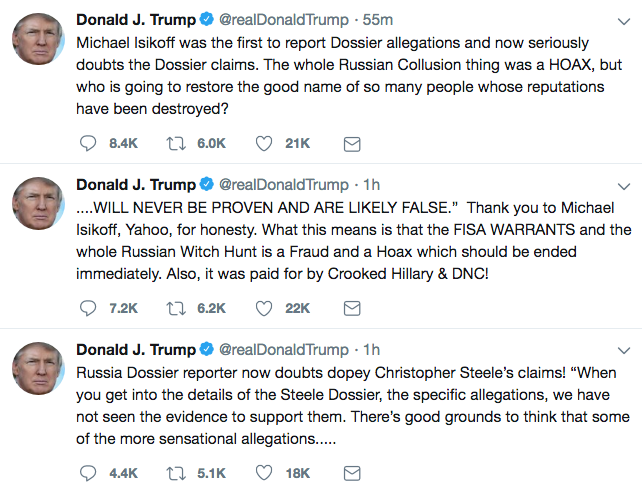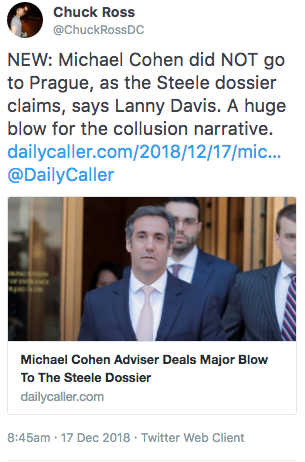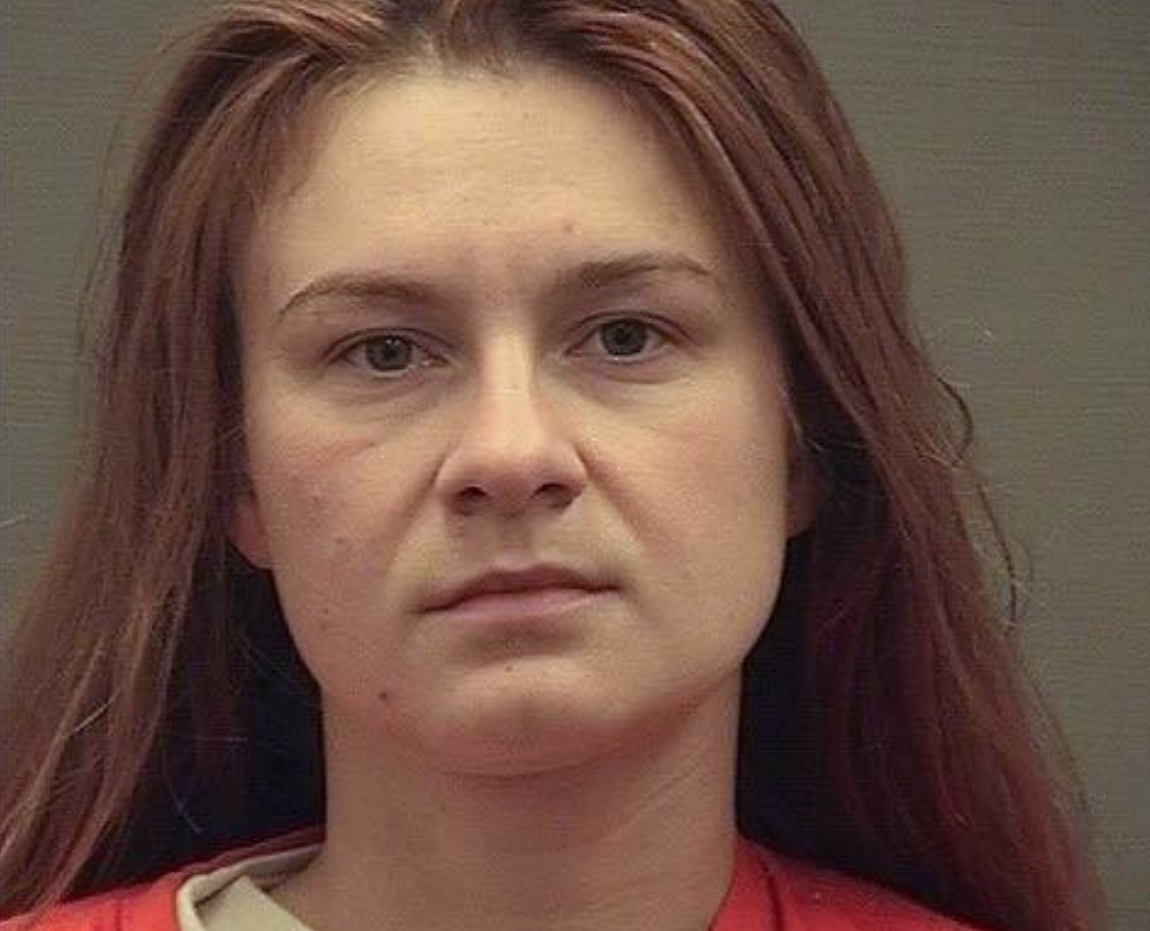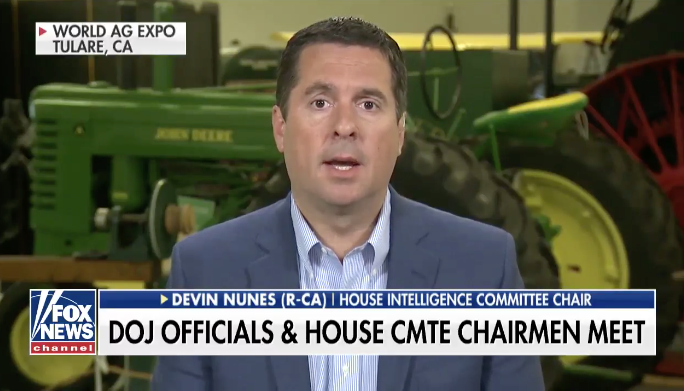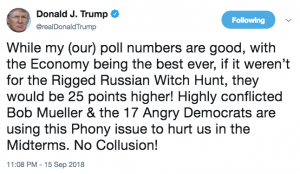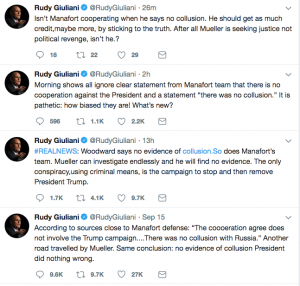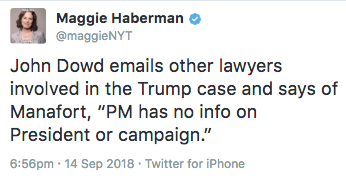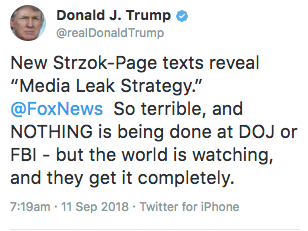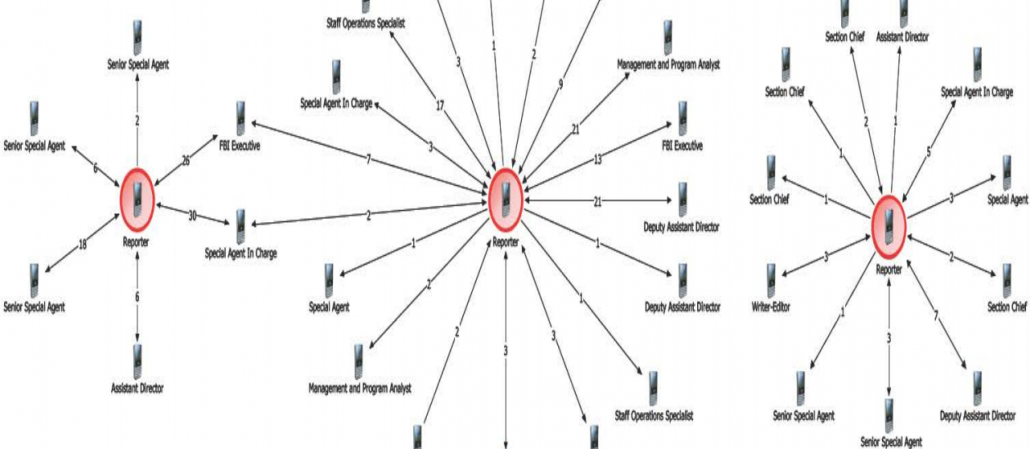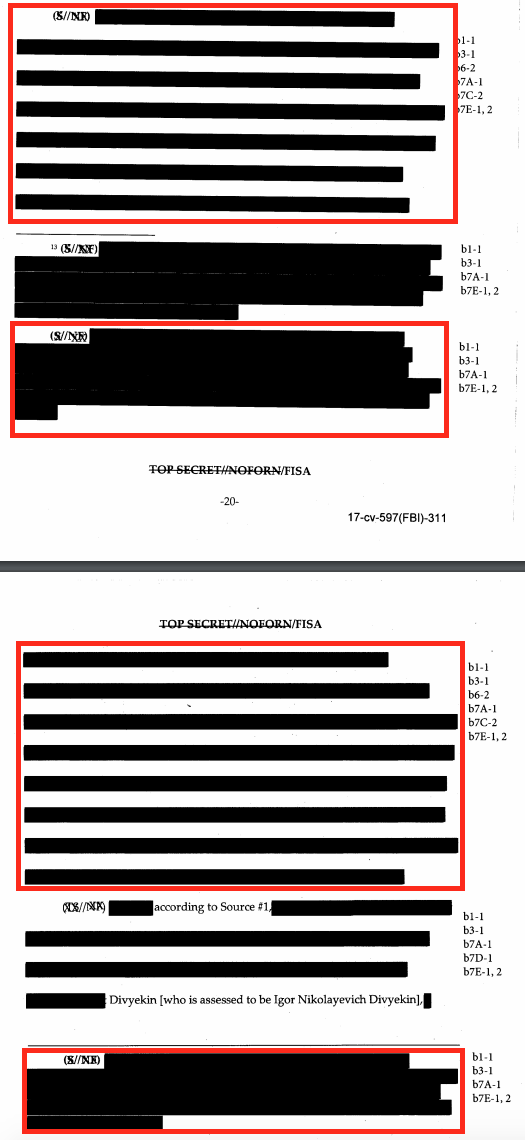The Game of Telephone that Has Attorney General William Barr in a Lather
When, close to the end of a day-long interview with Congress last October, Mark Meadows asked George Papadopoulos what he wanted to tell the American people about himself, the President’s former foreign policy advisor insisted he had had “no Russia connection whatsoever.” Instead, he insisted, the things that happened to him in 2016 and 2017 were just a conspiracy spun by Western diplomats and spies, not Russian ones.
Mr. Papadopoulos. George Papadopoulos has no Russia connection whatsoever, never did. He found himself mired in a Russia conspiracy, which makes no sense to him and I assume probably everyone in this room, and probably half the American public. I had many contacts with western intelligence and western diplomats. Some might have been masquerading as something they were not, like I assume Joseph Mifsud was, if his lawyer is to be believed. Stefan Halper, Alexander Downer. And I just really want to get to the bottom of why I was targeted by these very seasoned diplomats and intelligence officials, and what I was used for. And I think everybody really wants to figure that out, because I think figuring that out will unlock many mysteries in this entire investigation. And that’s why I think — that’s really what I’m at the core of, not the core of a Russia conspiracy.
But when he described what he was thinking when he pled guilty in October 2017 to one false statements charge instead of multiple false statements charges, an obstruction charge, and possibly serving as a unregistered Agent of Israel, Papadopoulos described believing that he was “in the middle of a real Russia conspiracy.”
And just going back in my memory, I guess the logic behind my guilty plea was that I thought I was really in the middle of a real Russia conspiracy, that this was all real, and that I had to plead out or face life in prison, the way they were making it seem.
Over the course of an interview where he frequently contradicted himself, Papadopoulos provided ample evidence that he did — almost certainly correctly — think he was being cultivated by people with ties to Russia during and after the election. There’s the description — the timeline of which Papadopoulos significantly distorts — of how he balked at an offer Sergei Millian made to be paid $30,000 a month so long as he worked in the Administration, but then still spent the night of the inauguration drinking with Millian in DC.
A Mostly talking about the potential that if I had formally left the campaign, which I had considered around certain months, that we would engage in some legitimate business that he might have. And then I made it clear to him that any business that we would be talking about would be completely illegal. I wouldn’t be part of the Trump campaign organization or have absolutely nothing to do with Trump himself if I’m going to work with you, or anybody else, by the way. And then he decided to present some sort of ambiguous business proposal to me. One day, in October or November in Chicago, where I felt that he was wearing a wire or he was setting me up for something about this proposal that he was talking about. He came to Chicago, we met at Trump Tower. He was very nervous, and he started telling me yet this deal that I think is for $30,000 a month, it’s a PR gig for a contact of mine in Russia.
Q Contact of his?
A His. Something — I never, to this day, I never really understood what this was. And but you have to understand, George, that if we do this you still have to work for Trump. And he was looking at me with his eyes really bogged out, very nervous. And I just looked at him, like this guy is on an operation against me right now trying to set me up for something. And I flatly told him, as far as I remember, No, I’m not taking this offer, because it’s illegal what you’re talking about, at least I thought it was illegal.
And there’s the way he moves from his false description that he stopped communicating with Joseph Mifsud in summer 2016 (on October 1, 2016, he sent Mifsud a link over Facebook to the Interfax column that got him fired from the campaign) to describing how Mifsud was actually still reaching out after the FBI interviewed Papadopoulos in January 2017, trying to set him up in business with his Swiss lawyer Stephan Roh.
Q Yes. So you stated earlier that as of summer 2016, you stopped communicating with Mr. Mifsud?
A That’s what I re — I believe that’s when I stopped talking to him, yes.
Q So after you stopped talking to Mr. Mifsud, did he ever attempt to reach out to contact you?
A What I remember is — I don’t know the months, okay? So I’m just letting you know what he was trying to accomplish, after it seems that I kicked him to the side about the campaign involvement, he introduced me over email to his current lawyer, Stephan Roh, as somebody that I might be interested in working with or on a project with. I — then I had a couple of Skype calls with Stephan Roh, and then, I believe, Mifsud was actually reaching out to me at the same time the FBI came to my house.
In both cases, Papadopoulos now dismisses that outreach claiming it came from Western, not Russian, intelligence because the people making the outreach made the claim. Thus the narrative: George has no Russia connection whatsoever, it was all a big Western intelligence trap for Donald Trump.
At the time he did this interview, Papadopoulos had gotten a new lawyer, Caroline Polisi, who was prepping a challenge to his incarceration. The whole interview — which was done without having any documentation that might have forced Papadopoulos to stick to the actual written record — was designed to feed that effort. Polisi repeatedly prevented Democrats from asking legitimate questions about what Papadopoulos actually did — including why he deactivated his Facebook account the day after his second FBI interview and why he called Trump’s then defense attorney, Marc Kasowitz, after he had been asked to wear a wire by the FBI.
But the interview is a significant part of the basis for the current effort to discredit the Russian investigation by declassifying materials that — proponents of the effort, including Trump, Mark Meadows, Jim Jordan, and Attorney General Barr claim — will show that Trump was spied on in inappropriate ways.
Of course, then, as in Barr’s May 1 testimony to Congress, a significant part of the “evidence” that something untoward happened is actually the absence of evidence: because the FBI — having been directed not to do anything overt on this investigation during the campaign precisely to avoid affecting the election — did not interview Papadopoulos until January 2017, Republican staffer Ryan Breitenbach suggests that’s proof of something illegal.
Q We understand now that — I believe, previously, Congressman Ratcliffe was indicating that you are generally considered the predication for the entire Trump-Russia investigation, which we now understand to have started at the end of July of 2016. So between July of 2016 and January 2017, you are the predicate of the investigation, but you’re not interviewed until January of 2017. Is that correct?
A That’s correct.
Q And throughout that intervening period, from July of 2016 through January of 2017, you don’t recall any instances where the FBI or anyone in the U.S. Government was attempting to contact you or interview you?
[snip]
Mr. Papadopoulos. No, no, absolutely not. I don’t have — I don’t recall any U.S. Government official or intelligence official openly reaching out to me to talk about this —
The other pieces of “proof” that something untoward came out of this hearing are even more crazy.
First, there’s Papadopoulos’ suspicion, generated after a year of mostly ignorant claims in the press about Carter Page’s FISA application, suggesting there must have been a FISA order targeting him because the FBI knew, when they first interviewed him in January 2017, that he had significant ties to Israel.
Mr. Papadopoulos. I– the reason I’m suggesting that there was a FISA was because there was tremendous scrutiny on — with my ties to Israel, to the point where I had apparently a formal charge of acting as an agent of Israel, which I don’t know how that’s even possible really, but there was a charge. And by the time I had my first interview with the FBI, they led me to believe that they knew about certain meetings I was having, who I knew in the Israeli Government domestically and abroad. That’s how I remember it. And that they were very angry almost about my ties to Israel, to the extent, as I mentioned, during my second encounter I remember the agent, Curtis Heide, telling me, oh, you don’t want to wear a wire, just know that you’re lucky Israel is an ally or else we would be going after you, something incredibly bizarre.
Mr. Meadows. So what you’re saying is, they had knowledge of private conversations and communications that you had with other individuals that would have taken extraordinary measures to find out. They couldn’t have found it on Facebook or read it in The Hill or someplace.
Mr. Papadopoulos. That’s — that’s what I believe, yes.
To be absolutely clear: I think it quite possible the FBI, later, got a FISA order targeting Papadopoulos (perhaps around April 2017, once they discovered that he had lied at this interview). But it’s unlikely they had one in January 2017, in part because they were unaware of his conversations with Ivan Timofeev. A deep knowledge of his ties to Israel but not his ties to Russian-linked individuals is what you might expect from FISA orders (and 12333 collection and HUMINT) targeting others, not Papadopoulos.
And Mark Meadows, whose job it is to oversee FISA, is supposed to know that. Papadopoulos is not. Nevertheless, Meadows allows a guy who has an ulterior motive but no actual knowledge to convince him of something that Meadows, at least, should have the knowledge to be skeptical of.
Then there’s what Republicans believe will be exculpatory information from a suspected recording taken by Stefan Halper in his FBI-arranged meeting with Papadopoulos in September 2016. The belief there’s a transcript (which may be true) comes not from actual knowledge, but from the fact that Papadopoulos’ original lawyers (who have said publicly there was nothing untoward about his treatment by the FBI) also knew that when Halper met with him, Papadopoulos used the word “treason” to deny any ties to the Russian hack-and-leak operation.
Mr. Meadows. About recordings or transcripts of Mr. Halper?
Mr. Papadopoulos. I never saw anything, but my lawyers, to be clear, they had made a passing remark about something that I said about treason —
Meadows leads Papadopoulos to describe the Halper interview. Because of the cues Meadows uses, which describe “benefitting from Hillary Clinton emails” as “collusion,” in the exchange he gets Papadopoulos describing simply benefitting from the emails (something that the Mueller Report describes Roger Stone to have done, on the orders of then candidate Trump) to be treason.
Mr. Papadopoulos. And after he was throwing these allegations at me, I —
Mr. Meadows. And by allegations, allegations that the Trump campaign was benefiting from Hillary Clinton emails?
Mr. Papadopoulos. Something along those lines, sir. And I think I pushed back and I told him, I don’t know what the hell you’re talking about. What you’re talking about is something along the lines of treason. I’m not involved. I don’t know anyone in the campaign who’s involved. And, you know, I really have nothing to do with Russia. That’s — something along those lines is how I think I responded to this person.
Mr. Meadows. So essentially at this point, he was suggesting that there was collusion and you pushed back very firmly is what it sounds like.
I actually think that if there is a transcript, it would show that what Halper asked more specifically about — and so what Papadopoulos called “treason” — was whether the campaign was involved in or knew of the Russian hacking, not just whether they had worked hard to benefit from the emails after they had been hacked, as Papadopoulos describes here.
And all of a sudden he pulls out his phone — remember, this phone element again — and he puts it in front of him and he begins to start talking about Russia and hacking and if I’m involved, if the campaign is involved, if it’s benefiting the campaign. Something along those lines. I’m sure the transcript exists and you’ve probably read it, so I don’t want to be wrong on exactly what he said.
But Meadows, either because he’s a frightfully stupid man or bad at playing his designated hoaxster role, instead defines “collusion” to be simply benefitting from the emails — something that the campaign did and was still doing at the time of the Halper interview — he sets up that the key point of Papadopoulos’ interview to be that he denied, in strong terms, something that, in fact, the campaign (though Papadopoulos was too junior to be involved) was doing, with the knowledge of Trump himself.
Still, a transcript showing Papadopoulos denying that he knew of any campaign involvement in the emails, even while he labeled some form of it to be treason, would not be exculpatory. Rather, it would explain why, when asked directly about such things the following year, Papadopoulos lied and tried to hide evidence. That is, declassifying a transcript that showed Papadopoulos treated what the campaign was doing as treason would actually be inculpatory because it would explain why he lied: because he thought he might be on the hook for treason.
But Meadows (again, perhaps because he’s a frightfully stupid man) instead believes that if the transcript shows that Papadopoulos pushed back aggressively on a topic that the FBI later showed him to be (and he pled guilty to have) lying about, it would be proof that the investigation should never have started.
Mr. Meadows. So on a scale of 1 to 10, with 10 being the most aggressive in terms of your pushback, what number would you categorize your pushback from Mr. Halper when he was asking you about your involvement with Russia?
Mr. Papadopoulos. Ten.
Mr. Meadows. It’s a ten?
Mr. Papadopoulos. Yeah.
Mr. Meadows. So what you’re telling me is that colluding with the Russians was the last thing on anybody’s mind at that particular point?
Mr. Papadopoulos. Last thing on my mind, certainly, I can only speak for myself.
This thread of questioning is all the more problematic because Papadopoulos answers some questions about what he was doing at the time inconsistently in the hearing, and they’re questions he has obstructed on in the past.
For example, in response to a question from Democratic staffer Susanne Sachsman Grooms, Papadopoulos claims he doesn’t know whether Walid Phares was part of a discussion about setting up a meeting in London with Putin’s office in September 2016, the same month Papadopoulos met Halper.
Q Did you discuss your efforts to set up the Putin-Trump meeting with Mr. Phares?
A I’m not sure he was copied on those particular emails, but I could send whatever emails I have with him to the committee. It’s fine with me.
Papadopoulos admits Republican staffer Art Baker precisely the details he denies to Sachsman Grooms.
And who did you discuss with at the campaign the idea of campaign officials going to go meet with Russian officials abroad? A I believe that there was a short period in which Sam Clovis, myself, and Walid Phares were discussing this potential trip. There could have been others copied on an email, something like that. But that’s what I remember at this moment.
More importantly, as the Mueller Report makes clear, this is a topic that Papapdopoulos refused to cooperate on during his proffers with the FBI. Here are Papadopoulos’ notes planning that “lot of risk meeting,” which the report notes he, “declined to assist in deciphering … telling investigators that he could not read his own handwriting from the journal.”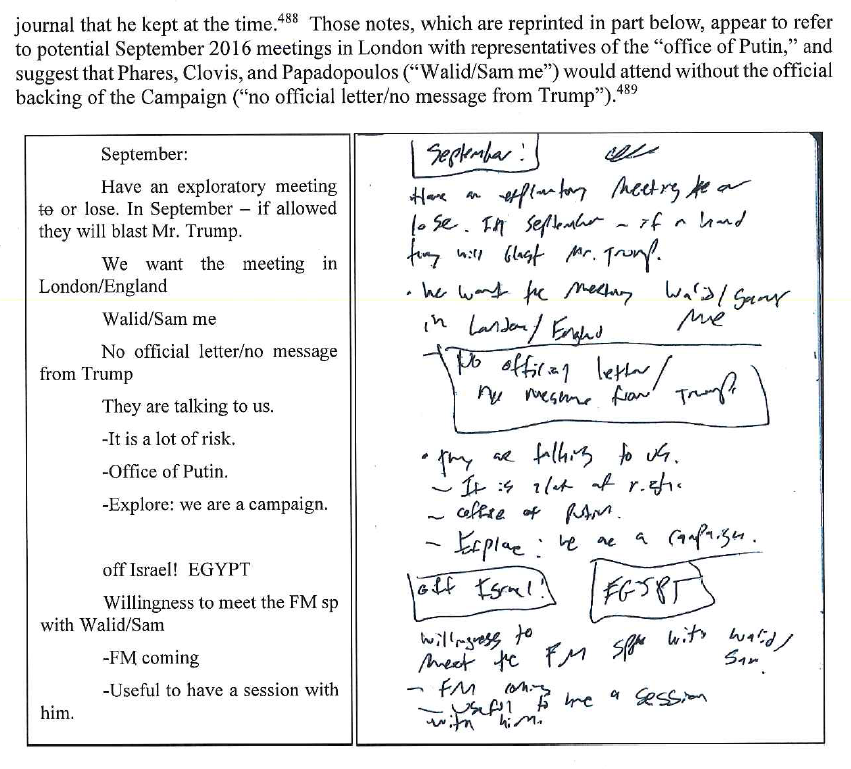
Similarly, Papadopoulos claims to remember stopping communicating with Mifsud in summer 2016.
Q When was the last time you remember communicating with Professor Misfud?
A Off the top of my memory I think it was the summer of 2016.
Q Do you remember why you stopped communicating with him?
A I can’t remember exactly, I just didn’t really think he was a man of real substance at some point.
Not only did he appear to still be communicating with him in 2017, but an October 1, 2016 Facebook message to Mifsud was among the things the FBI said Papadopoulos was trying to hide when he tried to delete his Facebook account the day after his second FBI interview.
The Facebook account that PAPADOPOULOS shut down the day after his interview with the FBI contained information about communications he had with Russian nationals and other foreign contacts during the Campaign, including communications that contradicted his statements to the FBI. More specifically, the following communications, among others, were contained in that Facebook account, which the FBI obtained through a judicially authorized search warrant.
[snip]
On or about October 1, 2016, PAPADOPOULOS sent [Mifsud] a private Facebook message with a link to an article from Interfax.com, a Russian news website. This evidence contradicts PAPADOPOULOS’s statement to the Agents when interviewed on or about January 27, 2017, that he had not been “messaging” with [Mifsud] during the campaign while “with Trump.”
In other words, at precisely the time he was interviewed by Halper, Papadopoulos was still in touch with Mifsud, and after being arrested for hiding that fact in 2017, he continued to obscure that detail when asked what his mindset was in 2016 when asked about it in 2018.
By all means, let’s see that transcript discussing what Papadopoulos thought amounted to treason. But I doubt it’s going to be exculpatory.
Finally, the craziest aspect of this game of chicken is how the Republicans on the committee repeatedly get him to reveal his beliefs about what happened to him actually come from press reporting on his case.
To explain his belief that Mifsud actually worked for Western intelligence, Papadopoulos cited Chuck Ross.
Papadopoulos continues to tell tales. When giving testimony to Congress, Papadopoulos cited a Daily Caller article to claim that Joseph Mifsud worked with Western intelligence. “I don’t want to espouse conspiracy theories because, you know, it’s horrifying to really think that they might be true, but just yesterday, there was a report in the Daily Caller from his own lawyer that he was working with the FBI when he approached me. And when he was working me, I guess — I don’t know if that’s a fact, and I’m not saying it’s a fact — I’m just relaying what the Daily Caller reported yesterday, with Chuck Ross, and it stated in a categorical fashion that Stephan Roh, who is Joseph Mifsud’s, I believe his President’s counsel, or PR person, said that Mifsud was never a Russian agent.
To explain his belief that there was a transcript of his conversations with Stefan Halper, he cites John Solomon.
And all of a sudden he pulls out his phone — remember, this phone element again — and he puts it in front of him and he begins to start talking about Russia and hacking and if I’m involved, if the campaign is involved, if it’s benefiting the campaign. Something along those lines. I’m sure the transcript exists and you’ve probably read it, so I don’t want to be wrong on exactly what he said. But —
Mr. Meadows. You say a transcript exists. A transcript exists of that conversation?
Mr. Papadopoulos. That’s I guess what John Solomon reported a couple days ago. Mr. Meadows. So are you aware of a transcript existing? I mean —
Mr. Papadopoulos. I wasn’t aware of a transcript existing personally.
And to explain his opinions about “Azra Turk” being a honey pot, he says he has no independent memory, but is relying on what the NYT reported (though I’m not sure which story).
She then apparently — I don’t remember it, I’m just reading The New York Times. She starts asking me about hacking. I don’t remember her actually asking me that, I just read it in The New York Times. Nevertheless, she introduces me the next time to Stefan Halper.
Mr. Meadows. She asked you about hacking?
Mr. Papadopoulos. I don’t remember it. I just — I think I read that particular —
Mr. Meadows. You’ve read that?
Mr. Papadopoulos. Yes, that’s what I — I think I read it in The New York Times.
Much of the current investigation into the investigation, then, stems from a hearing where:
- Mark Meadows and other Republicans let Papadopoulos testify about what he read in the news, but not key details about his first hand knowledge of events
- Papadopoulos’ inconsistent testimony replicated his past obstruction
- Meadows let someone who should know less than Meadows himself does about FISA misrepresent how it works as testimony
- Once again, FBI’s conservative approach with this investigation is instead cited as proof of spying
This is what has Attorney General in a lather right now: claims originating in this hearing.
As I disclosed last July, I provided information to the FBI on issues related to the Mueller investigation, so I’m going to include disclosure statements on Mueller investigation posts from here on out. I will include the disclosure whether or not the stuff I shared with the FBI pertains to the subject of the post.





